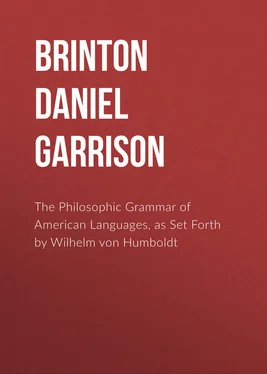Daniel Brinton - The Philosophic Grammar of American Languages, as Set Forth by Wilhelm von Humboldt
Здесь есть возможность читать онлайн «Daniel Brinton - The Philosophic Grammar of American Languages, as Set Forth by Wilhelm von Humboldt» — ознакомительный отрывок электронной книги совершенно бесплатно, а после прочтения отрывка купить полную версию. В некоторых случаях можно слушать аудио, скачать через торрент в формате fb2 и присутствует краткое содержание. ISBN: , Жанр: foreign_antique, foreign_prose, на английском языке. Описание произведения, (предисловие) а так же отзывы посетителей доступны на портале библиотеки ЛибКат.
- Название:The Philosophic Grammar of American Languages, as Set Forth by Wilhelm von Humboldt
- Автор:
- Жанр:
- Год:неизвестен
- ISBN:http://www.gutenberg.org/ebooks/36646
- Рейтинг книги:5 / 5. Голосов: 1
-
Избранное:Добавить в избранное
- Отзывы:
-
Ваша оценка:
- 100
- 1
- 2
- 3
- 4
- 5
The Philosophic Grammar of American Languages, as Set Forth by Wilhelm von Humboldt: краткое содержание, описание и аннотация
Предлагаем к чтению аннотацию, описание, краткое содержание или предисловие (зависит от того, что написал сам автор книги «The Philosophic Grammar of American Languages, as Set Forth by Wilhelm von Humboldt»). Если вы не нашли необходимую информацию о книге — напишите в комментариях, мы постараемся отыскать её.
The Philosophic Grammar of American Languages, as Set Forth by Wilhelm von Humboldt — читать онлайн ознакомительный отрывок
Ниже представлен текст книги, разбитый по страницам. Система сохранения места последней прочитанной страницы, позволяет с удобством читать онлайн бесплатно книгу «The Philosophic Grammar of American Languages, as Set Forth by Wilhelm von Humboldt», без необходимости каждый раз заново искать на чём Вы остановились. Поставьте закладку, и сможете в любой момент перейти на страницу, на которой закончили чтение.
Интервал:
Закладка:
The latter exerts always a more profound and often a more beneficial influence. The organism of both tongues may be destroyed, but the dissolvent force is also an organic and vital one, and from the ruins of both constructs a speech of grander plans and with wider views. “The seemingly aimless and confused interminglings of primitive tribes sowed the seed for the flowers of speech and song which flourished in centuries long posterior.”
The immediate causes of the improvement of a language through forcible admixture with another, are: that it is obliged to drop all unneccessary accessory elements in a proposition; that the relations of ideas must be expressed by conventional and not significant syllables; and that the limitations of thought imposed by the genius of the language are violently broken down, and the mind is thus given wider play for its faculties.
Such influences, however, do not act in accordance with fixed laws of growth. There are no such laws, which are of universal application. The development of the Mongolian or Aryan tongues is not at all that of the American. The goal is one and the same, but the paths to it are infinite. For this reason each group or class of languages must be studied by itself, and its own peculiar developmental laws be ascertained by searching its history. 32 32 This reasoning is developed in the essay, Ueber das Vergleichende Sprachstudium , etc., Gesammelte Werke , Bd. iii, ss. 241-268; and see ibid, s. 270.
With reference to the growth of American languages, it was Humboldt’s view that they manifest the utmost refractoriness both to external influence and to internal modifications. They reveal a marvellous tenacity of traditional words and forms, not only in dialects, but even in particular classes of the community, men having different expressions from women, the old from the young, the higher from the lower classes. These are maintained with scrupulous exactitude through generations, and except by the introduction of words, three centuries of daily commingling with the white race, have not at all altered the grammer and scarcely the phonetics of many of their languages.
Nor is this referable to the contrast between an Aryan and an American language. The same immiscibility is shown between themselves. “Even where many radically different languages are located closely together, as in Mexico, I have not found a single example where one exercised a constructive or formative influence on the other. But it is by the encounter of great and contrasted differences that languages gain strength, riches, and completeness. Only thus are the perceptive powers, the imagination and the feelings impelled to enrich and extend the means of expression, which, if left to the labors of the understanding alone, are liable to be but meagre and arid.” 33 33 See the essay Ueber die Buchstabenschrift und ihren Zusammenhang mit dem Sprachbau, Ges. Werke , Bd. vi, ss. 551-2.
§ 9. Internal Form of Languages
Besides the grammatical form of a language, Humboldt recognized another which he called its internal form . This is that subtle something not expressed in words, which even more than the formal parts of speech, reveals the linguistic genius of a nation. It may be defined as the impression which the language bears of the clearness of the conceptions of those speaking it, and of their native gift of speech. He illustrates it by instancing the absence of a developed mode in Sanscrit, and maintains that in the creators of that tongue the conception of modality was never truly felt and distinguished from tense. In this respect its inner form was greatly inferior to the Greek, in the mind of which nation the ideally perfect construction of the verb unfolded itself with far more clearness.
The study of this inner form of a language belongs to the highest realm of linguistic investigation, and is that which throws the most light on the national character and capacities. 34 34 On this subtle point, which has been by no means the least difficult to his commentators, see Humboldt’s Introduction Ueber die Verschiedenheit , etc., Ges. Werke , Bd. vi, ss. 45-6, 92-5, 254-5, by a careful comparison of which passages his real intent will become apparent.
§ 10. Criteria of Rank in Languages
Humboldt’s one criterion of a language was its tendncy to quicken and stimulate mental action . He maintained that this is secured just in proportion as the grammatical structure favors clear definition of the individual idea apart from its relations, in other words, as it separates the material from the inflectional elements of speech. Clear thinking, he argued, means progressive thinking. Therefore he assigned a lower position both to those tongues which inseparably connect the idea with its relations, as the American languages, and to those which, like the Chinese and in a less degree the modern English, have scarcely any formal elements at all, but depend upon the position of words (placement) to signify their relations.
But he greatly modified this unfavorable judgment by several extenuating considerations.
Thus he warns us that it is of importance to recognize fully “that grammatical principles dwell rather in the mind of the speaker than in the material and mechanism of his language.” 35 35 Lettre à M. Abbe-Remusat, Ges. Werke , Bd. vii, s. 396.
This led him to establish a distinction between explicit grammar, where the relations are fully expressed in speech, and implicit grammar, where they are wholly or in part left to be understood by the mind.
He expressly and repeatedly states that an intelligent thinker, trained in the grammatical distinctions of a higher language, can express any thought he has in the grammar of any other tongue which he masters, no matter how rude it is. This adaptability lies in the nature of speech in general. A language is an instrument, the use of which depends entirely on the skill of him who handles it. It is doubtful whether such imported forms and thoughts appeal in any direct sense to those who are native to the tongue. But the fact remains that the forms of the most barbarous languages are such that they may be developed to admit the expression of any kind of idea.
But the meaning of this must not be misconstrued. If languages were merely dead instruments which we use to work with, then one would be as good as another to him who had learned it. But this is not the case. Speech is a living, physiological function, and, like any other function, is most invigorating and vitalizing when it works in the utmost harmony with the other functions. Its special relationship is to that brain-action which we call thinking; and entire harmony between the two is only present when the form, structure and sounds of speech correspond accurately to the logical procedure of thought. This he considered “an undeniable fact.”
Конец ознакомительного фрагмента.
Текст предоставлен ООО «ЛитРес».
Прочитайте эту книгу целиком, купив полную легальную версию на ЛитРес.
Безопасно оплатить книгу можно банковской картой Visa, MasterCard, Maestro, со счета мобильного телефона, с платежного терминала, в салоне МТС или Связной, через PayPal, WebMoney, Яндекс.Деньги, QIWI Кошелек, бонусными картами или другим удобным Вам способом.
Читать дальшеИнтервал:
Закладка:
Похожие книги на «The Philosophic Grammar of American Languages, as Set Forth by Wilhelm von Humboldt»
Представляем Вашему вниманию похожие книги на «The Philosophic Grammar of American Languages, as Set Forth by Wilhelm von Humboldt» списком для выбора. Мы отобрали схожую по названию и смыслу литературу в надежде предоставить читателям больше вариантов отыскать новые, интересные, ещё непрочитанные произведения.
Обсуждение, отзывы о книге «The Philosophic Grammar of American Languages, as Set Forth by Wilhelm von Humboldt» и просто собственные мнения читателей. Оставьте ваши комментарии, напишите, что Вы думаете о произведении, его смысле или главных героях. Укажите что конкретно понравилось, а что нет, и почему Вы так считаете.












